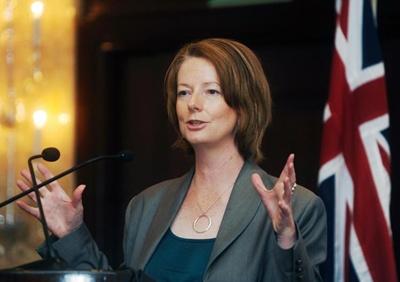Two coups; one outcome

Democracy is hurt by transnational corporate interests. By Vincent Browne.
Today, we look at two coups, one domestic and the other foreign.
Neither of these is actually seen as a coup, even though, in both instances, powerful vested interests used their corporate muscle to get their way.
The domestic coup had its manifestation in Nama and in that September 30, 2008 bailout of the banks.
(Picture: Julia Gillard, new Australian Prime Minister)
The bailout was decided upon by two of the most senior members of the government, Taoiseach Brian Cowen and Minister for Finance Brian Lenihan, acting on their own, with no mandate of any kind, either from the electorate or parliament.
That bailout, which deferred to the millionaire/billionaire depositors and bond-holders of the banks, is likely to cost this society massively in terms of healthcare, education, welfare and public goods for generations to come.
Yes, the two Brians got retrospective cover from their ministerial colleagues in phonecalls at dawn on September 30, 2008.
And yes, the parliament, which they control, gave retrospective approval.
However, no vote was cast by the sovereign authority of this country - its citizens - to approve of the most massive transfer of wealth from society at large to an elite, perhaps in our history, certainly since the Plantations.
The sheer lunacy of this was underlined in a throw-away comment buried in the Nama business plan published last Tuesday. On page 11, it said: ‘‘Nama will not engage in any speculative hoarding of assets.”
But isn’t that the point of Nama: to take bad loans, based on property assets, from the banks, hoard those assets for five, eight or ten years in the hope that market conditions will improve and we will all get our money back? If that wasn’t what Nama was about, then what was it about?
The whole Nama project is a gamble, with the speculative odds being calculated by precisely those guys from estate agents who got it all wrong on the property business in the last few years.
We build assumptions around the calculations of these guys and call it a business plan?
These guys had no clue what was going to happen a few years back and they still haven’t a clue. But Nama has recruited them from estate agents, given them the massive salaries to which they feel entitled, and then has based strategies on their guesswork, with billions of this society’s money at stake.
The other coup occurred in Australia a few weeks ago.
It was a calculated assault by corporate interests on the leader of the Australian government, which toppled him in 24 hours on June 24.This resulted in a turnaround of the policies to which the corporate interests objected.
Two months ago, Australian Labour Party prime minister Kevin Rudd proposed a ‘resource super profits’ tax, which involved a 40 per cent tax on mining profit, minus various tax-free allowances. It was to be an extension of a tax that applies to the petroleum industry and was expected to bring in several billion in additional revenue to the exchequer.
The mining industry went berserk and started a AU$100 million advertising campaign against the tax and against Rudd, they claimed the tax was against the general interests of all Australians - vested interests always contrive to present their demands in terms of the public interest and pay vast sums to public relations outfits to contrive such contortions.
The mining companies, which make AU$60 billion in profits, are controlled by some of Australia’s richest people.
For example, Gina Rinehart of Hancock Prospecting has personal wealth of AU$4.75 billion. Andrew Forrest of Fortescue Metals has a fortune of AU$4.2 billion. It is estimated that the top 25 mining industry owners have increased their personal wealth byAU$9 billion in the last year alone.
The advertising campaign was in support of their interests alone.
Rudd was not doing well in the polls. Support for his government had declined to 35% (what would Fianna Fáil give for that level of support?).
His own approval ratings, which had been at 70%, had declined to 36%.
The mining corporations’ advertising campaign was having an effect, aided and abetted by the substantial section of the media in Australia controlled by Rupert Murdoch.
Then, out of the blue, there was a leadership challenge to Rudd, led by his deputy prime minister, Julia Gillard (originally from Wales) and, within a day, he was gone.
The Australian Labour Party has been a pretty fractious outfit for a long time, with leadership heaves going on for years, but in this instance, there was no build-up, just a sudden coup and the prime minister was gone. Lindsay Tanner, the Minister for Finance, watched the leadership challenge on television, not knowing what was happening.
Once installed as prime minister, Gillard immediately entered into discussions with the mining bosses and, following a few further threats from those boys, she capitulated and the resource super profits tax was emasculated.
What is extraordinary about all this, aside from the coup itself, is that there is no apparent outrage in Australia over this spectacular capitulation to the mining corporations and their super-rich owners, nor any concern in the ‘democratic world’ over this very undemocratic coup.
But who cares about democracy, except when it is useful to spin the idea in favour of corporate profit somewhere?
